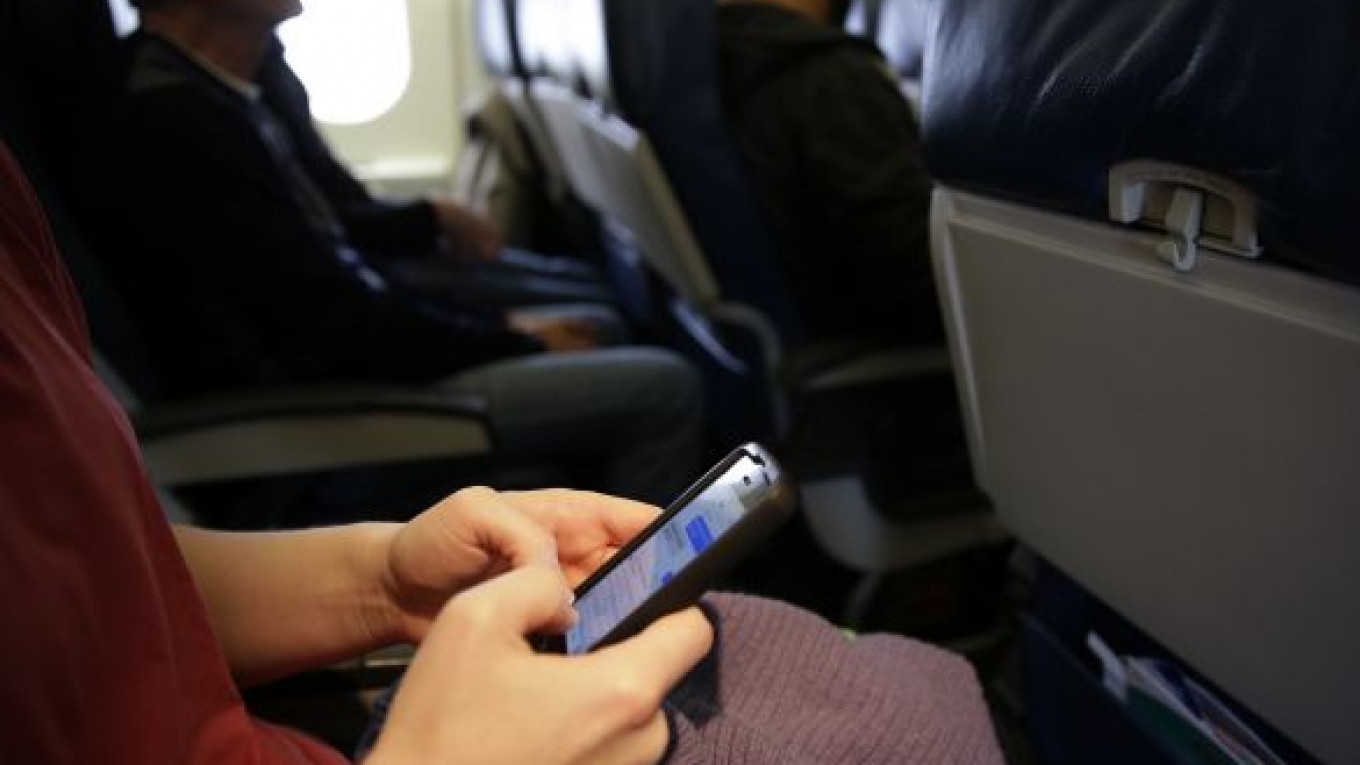Airline passengers who want to use their personal electronic devices should look out the window or check the flight tracker map to be sure of their location, as a recent relaxation of U.S. Federal Aviation Administration rules will not apply in Russian airspace.
"We are pleased to inform you that you no longer need to turn off your electronic devices before we depart," is what passengers taking off on a Delta Air Lines flight originating in the U.S. have been hearing for about a week now.
But passengers on non-U.S. based carriers, including those flying to and from Russia and anyone flying within the country, are unlikely to hear such an announcement anytime soon.
Last week the Federal Aviation Administration, or FAA, announced that U.S. based carriers in U.S. airspace are allowed to let passengers use tablets, e-readers, play computer games and watch films during the whole flight, including takeoff and landing.
But the requirement to switch off cell phones, which use a long-distance signal that may interfere with the navigation equipment, is still in place.
Previous policy called for all electronic devices to be turned completely off while planes were below 3,000 meters.
Russian airlines said they are also willing to reduce restrictions on the use of electronics on board if the local regulator allows.
"We do not exclude the possibility that electronic devices, which do not emit electromagnetic impulses or other signals that could hamper the work of navigation systems, may be allowed for use during the whole time of the flight," a spokesman for Russia's flag carrier Aeroflot said.
But in order to do so, there needs to be a positive determination made by flight safety specialists, Aeroflot said.
"If such rules are accepted by Russian aviation authorities as being safe, we will implement them," a spokesman for Transaero said.
Airlines in Russia comply to a 1995 regulatory law issued by the Transportation Ministry that says, according to scientific research and reports by airplane manufacturers, personal electronic devices, or PEDs, interfere with the airplane navigation equipment.
This law makes it obligatory for passengers as well as pilots to turn off their PEDs before the airplane gains altitude or as it starts descending. The Transportation Ministry said in a statement it is not planning on making any changes to that rule.
Russia is not alone in restricting the use of electronic devices on board. The same laws apply to most international flights.
Safety concerns over electronic devices that may interfere with onboard navigation systems have been the subject of debate in the aviation industry for many years.
The PED Aviation Rulemaking Committee did extensive research for the FAA before releasing a report saying that most commercial airplanes can tolerate radio interference signals from PEDs.
It recommended that the FAA provide airlines with new procedures so that they assess if their airplanes can tolerate radio interference from electronic devices.
Once they did that, they could allow passengers to use handheld, lightweight electronic devices at all altitudes, the FAA said.
Some airlines did asses whether their fleet can tolerate the use of PEDs and others did not.
"Changes will not happen immediately and will vary by airline," The New York Times reported, citing the F.A.A.
The agency advised passengers to check with their airline whether they could use their PEDs, the report said.
Delta Air Lines was the first to allow the use of PEDs on board, announcing that passengers were permitted to leave them on within an hour after the FAA introduced new rules.
Almost a week after applying the new policy, the airline said, "customer feedback has been overwhelmingly positive."
There were "several reports of customers clapping and cheering our flight crews when they announced that they can leave their portable electronic devices on," a spokesman for the airline said.
A requirement to turn off PEDs at takeoff and landing, which is to stay in place in Russia at least for a while, is actually not a very big deal, said Sergei Izvolsky, a spokesman for Russia's aviation regulatory authority.
"It does not take long for the plane to take off, gain altitude or descend, so these rules should not cause much discomfort for passengers," he said.
Some international frequent flyers agreed.
"I do not find it an issue," said Peter Lock, a CEO of an Australian-based mining company that does business in Russia. "If people cannot keep away from their phones for 15 to 20 minutes, they have a problem."
The revised rules could be an additional plus for flying short distances but it does not make much of a difference for long-distance flights, said Jari Jumpponen, head of East Office of Finnish Industries in Moscow.
"It is a minor issue and it is far more important that whatever the transportation method, the chosen vehicle is reliable, safe and runs on time," he said.
Contact the author at a.panin@imedia.ru
A Message from The Moscow Times:
Dear readers,
We are facing unprecedented challenges. Russia's Prosecutor General's Office has designated The Moscow Times as an "undesirable" organization, criminalizing our work and putting our staff at risk of prosecution. This follows our earlier unjust labeling as a "foreign agent."
These actions are direct attempts to silence independent journalism in Russia. The authorities claim our work "discredits the decisions of the Russian leadership." We see things differently: we strive to provide accurate, unbiased reporting on Russia.
We, the journalists of The Moscow Times, refuse to be silenced. But to continue our work, we need your help.
Your support, no matter how small, makes a world of difference. If you can, please support us monthly starting from just $2. It's quick to set up, and every contribution makes a significant impact.
By supporting The Moscow Times, you're defending open, independent journalism in the face of repression. Thank you for standing with us.
Remind me later.






